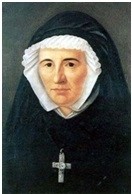Jesus & Mary
Return to Ethos.The congregation of Jesus & Mary was founded in Lyon France, by Claudine Thévenet [1774-1837], the daughter of a silk-merchant, together with André Coindre [1787-1826], a diocesan missionary who later founded the Brothers of the Sacred Heart [1821]. From the beginning of their partnership in mission to the urban poor in the aftermath of civil war, Claudine and Father Coindre moved beyond a small parish venture to ministries with a universal dimension. It was in the grim aftermath of the French Revolution that Claudine whose brothers and uncle were guillotined during the Reign of Terror spent her time, her energy and money in providing food, clothing, education and a secure home for orphaned and abandoned children. It is because of Claudine’s vision the order of Religious of Jesus & Mary was founded.St. Claudine Thévenet was the second child and eldest daughter of a bourgeois silk-merchant’s family, Claudine Thévenet was born in Lyon, France on Thursday, March 30th, 1774 and was baptised the next day, Good Friday. Her life began in the security of a pious and well-established Christian family, but was radically changed by the social and religious upheaval of the French Revolution [1789-1801].
In 1795, the “Reign of Terror” struck the teen-aged Claudine – known in her family as “Glady,” — in a deeply personal way, when she witnessed the brutal execution of two of her brothers, accused of taking part in the resistance Lyon had mounted. The final words her brothers spoke to her: “Forgive, Glady, as we forgive.” We have no personal written accounts to reveal Claudine’s thoughts and feelings. She seems to have been a woman of deeds rather than words. One account describes this event as a turning point in her young life. It was a sorrowful encounter with Christ crucified, whose dying words of forgiveness were “a light and support for her broken heart.” We do know that once the brothers’ betrayer was discovered, the family chose not to pursue his indictment. The gift of forgiveness was indeed received and offered.
Then on, Claudine was a faithful witness to pardon, in her work and her humble devotion to the Sacred Heart, from whom she learned active goodness and compassion. Her apostolic vision focused on young girls, whose desperate needs moved her to action. The evidence of her graced experience is seen in what shaped her life and ministry: the conviction that “the greatest misfortune is to live and die without knowing God.”
Claudine emerged as a leader in St. Bruno Parish, in the silk-workers’ district of the city, assuming the presidency of a lay sodality, the Pious Association of the Sacred Heart. Its members, young women of the bourgeoisie, were dedicated to works of piety and charity toward the poor. Under the direction of Father André Coindre, they organised a network of assistance to the needy of the city, through catechetical instruction, almsgiving, visiting hospitals and helping people to know God.
On October 6, 1818, at the age of 44, Claudine left her elderly mother and moved to a small apartment in Pierres-Plantées, with a silk-weaver, an orphan and a loom. So began her leadership as the founding superior of a new women’s congregation, known at the time as the “Sisters of the Sacred Hearts of Jesus and Mary.” At the first vow ceremony in 1823, she took the name of Mary St.Ignatius, in honor of the Jesuit founder who inspired her spirituality and shaped her apostolic style.
Three years later, the small group of sisters moved to the hill of Fourvière, where they began a flourishing providence and boarding school for girls. In time, there were five such institutions in the region. But struggles of every kind seemed to hamper the growth of Claudine’s congregation. When she died on February 3, 1837, her identification with Christ crucified and abandoned was complete. Only three communities remained to carry on the apostolic work she had begun. Her last words, “How good God is!” were an expression of her trust and an echo of Christ’s own cry of surrender.
Claudine Thévenet was beatified by Pope John Paul II on October 4, 1981, and canonised on March 21, 1993, the day after one of her Canadian daughters, Dina Bélanger, Marie Ste-Cécile de Rome [1897-1929], was beatified.



